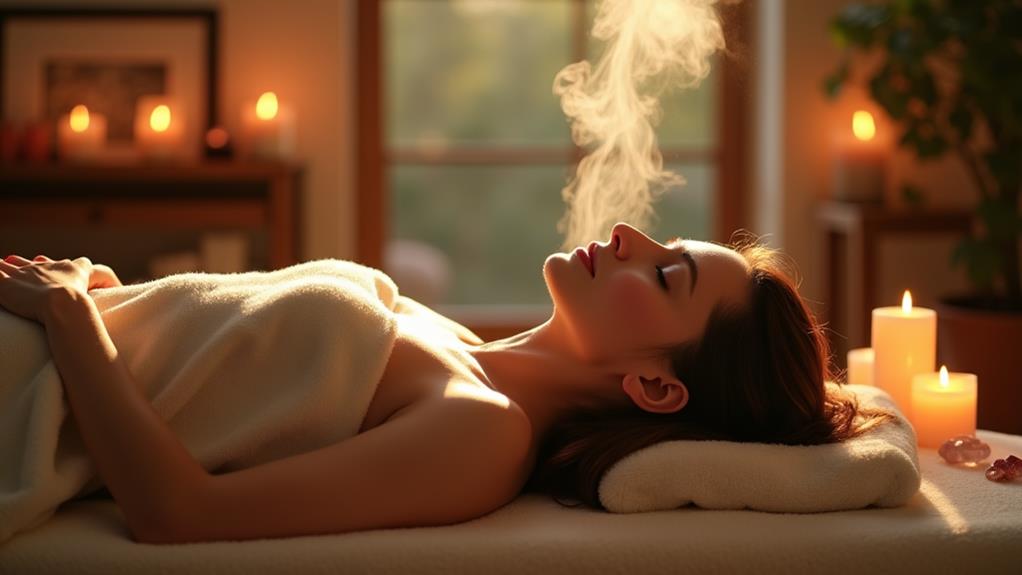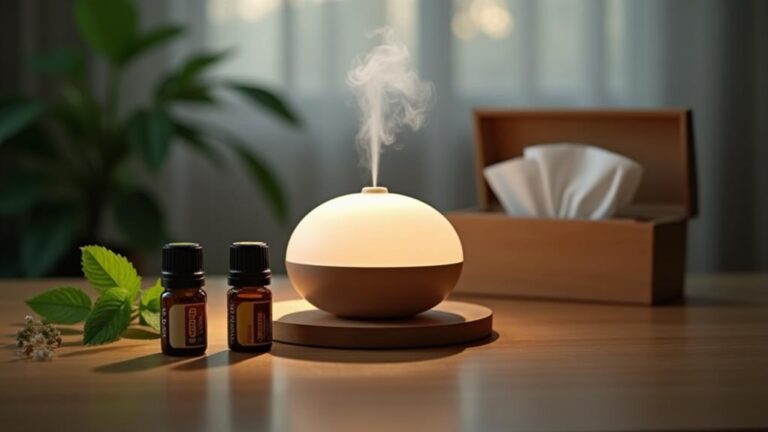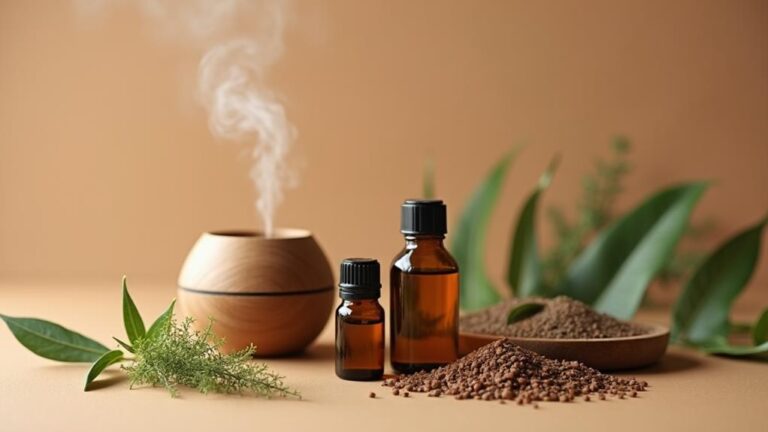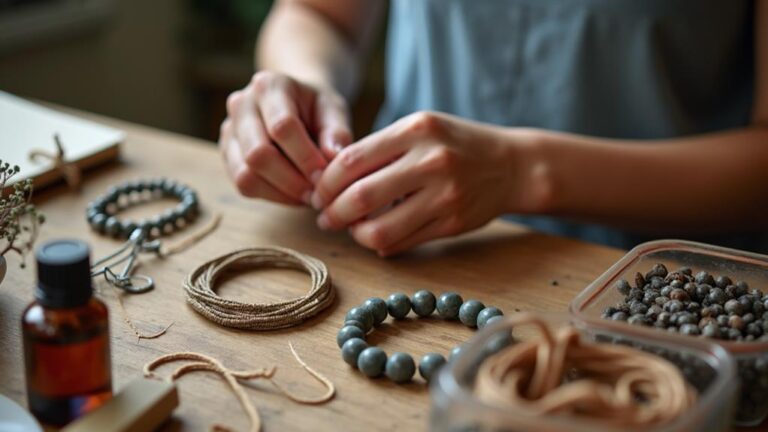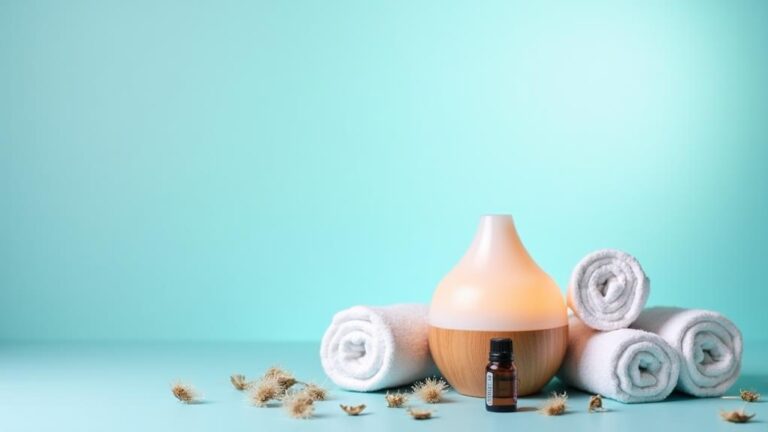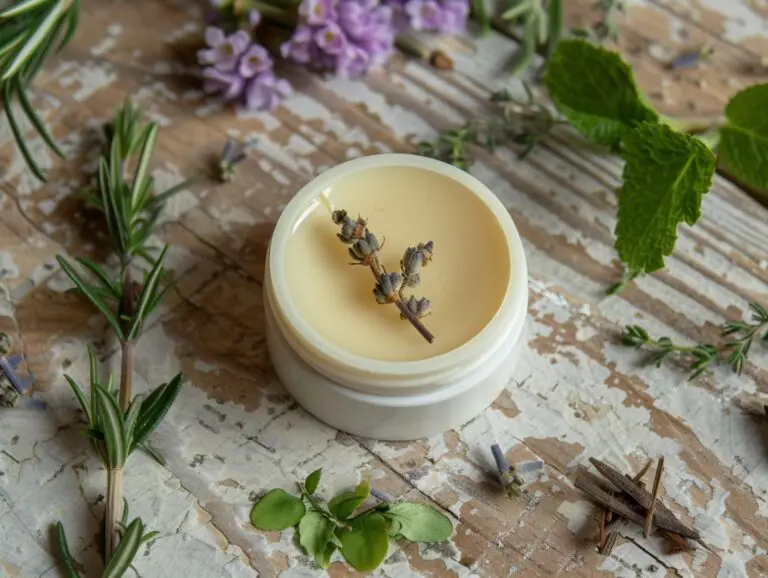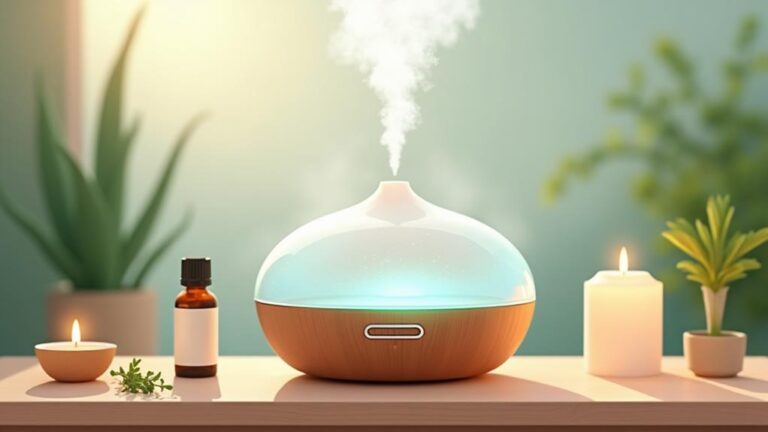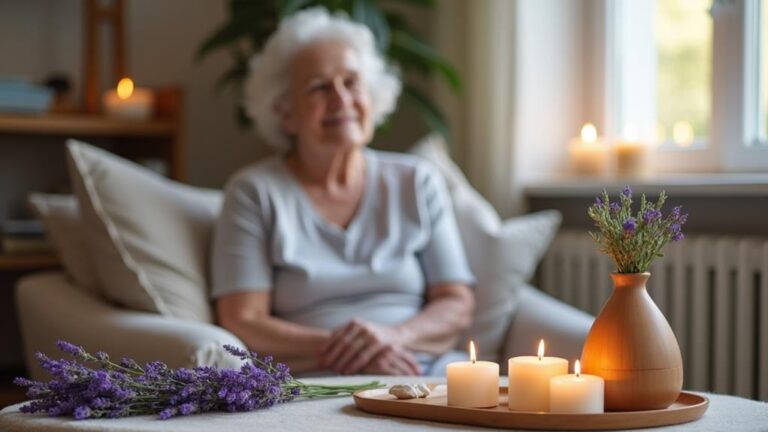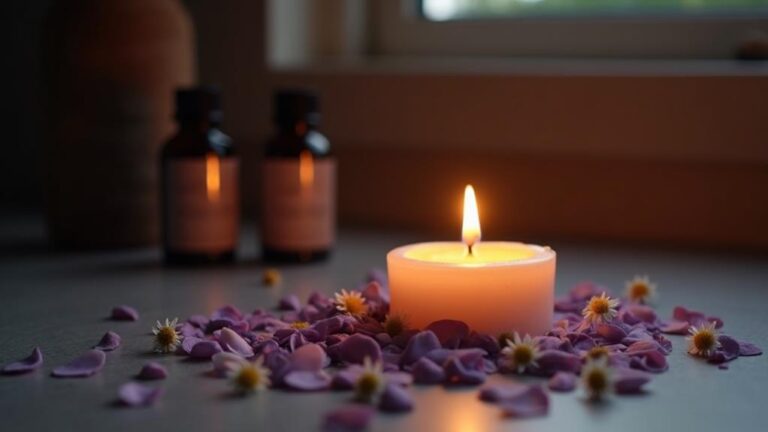Imagine a situation where you're struggling to fall asleep due to chronic stress, but after incorporating lavender oil into your evening routine, you begin to notice significant improvements in your sleep quality. This is just one example of the potential benefits of aromatherapy, a practice that's been gaining recognition in the field of alternative medicine. By harnessing the therapeutic properties of essential oils, aromatherapy offers a natural and non-invasive approach to promoting overall well-being. But how does it work, and what other benefits can it provide? The answer lies in understanding the complex relationship between essential oils and the human body.
Key Takeaways
- Aromatherapy uses essential oils to promote physical, emotional, and mental well-being, reducing stress and anxiety.
- Essential oils bind to odor receptors, affecting brain function and mood by interacting with neurotransmitters like serotonin and cortisol.
- Aromatherapy methods include diffusers, portable inhalers, bath water, massage oil, and topical application with a carrier oil.
- Certain essential oils like lavender and chamomile can alleviate symptoms of anxiety, manage chronic pain, and improve sleep quality.
- Aromatherapy can be used as a complementary therapy to traditional medicine, but consulting a healthcare provider is vital to ensure safe integration.
What Is Aromatherapy
Aromatherapy is a form of alternative medicine that utilizes essential oils, derived from plants, to promote physical, emotional, and mental well-being. When you explore the history of aromatherapy, you'll discover that it dates back thousands of years, with ancient civilizations such as Egypt, China, and Greece using essential oils for therapeutic purposes.
In modern times, aromatherapy has evolved to incorporate various techniques and equipment to maximize its benefits.
You'll find that aromatherapy equipment can range from simple diffusers that release a gentle mist of essential oils into the air to more complex devices that combine heat, light, and sound to create a holistic experience.
Aromatherapy equipment can also include nebulizers, which break down essential oils into tiny particles, and humidifiers, which add moisture to the air while releasing the fragrance of essential oils.
Understanding the history and equipment used in aromatherapy will help you appreciate the complexity and diversity of this alternative medicine.
As you explore aromatherapy, you'll discover a wide range of essential oils and techniques that can be tailored to suit your specific needs.
Benefits of Essential Oils
When you use essential oils in aromatherapy, you can experience significant benefits for your mental and emotional well-being.
By inhaling the fragrance of certain oils, you can reduce stress and anxiety, promoting a sense of calm and relaxation.
Essential oils can also help you prepare for a restful night's sleep, addressing insomnia and other sleep disorders that can impact your overall health.
Reduces Stress and Anxiety
You've likely experienced the debilitating effects of stress and anxiety, from a racing mind to a tense body. The good news is that aromatherapy can provide relief. Essential oils have been shown to reduce stress and anxiety by promoting relaxation and calming the mind and body. When inhaled, these oils can help slow down your heart rate, lower your blood pressure, and ease muscle tension.
Incorporating aromatherapy into activities like yoga applications and massage therapy can enhance their stress-reducing effects. During yoga, essential oils like lavender and chamomile can be inhaled to promote relaxation and balance.
In massage therapy, oils like bergamot and frankincense can be applied topically to reduce anxiety and promote feelings of calmness. By combining aromatherapy with these practices, you can experience a deeper sense of relaxation and reduced stress levels.
Regular use of aromatherapy can also help you develop coping mechanisms for managing stress and anxiety, leading to a more balanced and peaceful life.
Promotes Better Sleep
Millions of people struggle with sleep disorders, affecting their overall quality of life. You're likely no exception, and you're probably looking for natural ways to improve your sleep. Aromatherapy can be an effective solution, promoting better sleep by creating a relaxing atmosphere that calms your mind and body.
Certain essential oils, such as lavender and chamomile, have been shown to reduce stress and anxiety, making it easier to fall asleep.
To use aromatherapy for better sleep, try incorporating essential oils into your bedtime routine. You can diffuse the oils in your bedroom, add a few drops to your pillowcase, or use a sleep mask infused with calming scents.
Keeping a dream journal can also help you track your sleep patterns and identify any recurring themes or stressors that may be affecting your sleep. By combining aromatherapy with other relaxation techniques, such as deep breathing or meditation, you can improve the quality of your sleep and wake up feeling refreshed and rejuvenated.
With regular use, you can train your body to associate the calming effects of aromatherapy with sleep.
How Aromatherapy Works
How Aromatherapy Works
Frequently, aromatherapy's therapeutic effects are attributed to the complex interactions between essential oils and the human body. When you inhale essential oils, they bind to odor receptors in your nose, which sends signals to your brain. This affects brain function, influencing your mood, emotions, and behavior.
| Essential Oil | Neurotransmitter Regulation | Body Response |
|---|---|---|
| Lavender | Regulates serotonin | Promotes relaxation |
| Peppermint | Boosts dopamine | Enhances alertness |
| Frankincense | Inhibits cortisol | Reduces stress |
| Geranium | Balances estrogen | Relieves anxiety |
These interactions can alter neurotransmitter regulation, which affects various bodily functions. Research suggests that essential oils may interact with neurotransmitters, such as serotonin, dopamine, and cortisol, to produce therapeutic effects. As you explore aromatherapy, understanding these interactions can help you harness its benefits. By choosing the right essential oils, you can potentially influence your brain function and neurotransmitter regulation to achieve specific health benefits.
Common Aromatherapy Methods
Incorporating aromatherapy into your daily routine can be simple and effective. One common method is through the use of aromatherapy diffusers. These devices release a fine mist of essential oils into the air, allowing you to breathe in the benefits of aromatherapy.
You can place diffusers in your home or office, and many models come with adjustable settings and timers.
Another convenient method is using portable inhalers. These small devices contain a cloth or pad saturated with essential oils, which you can inhale directly. Portable inhalers are great for on-the-go use, allowing you to take a few deep breaths whenever you need a boost.
You can also use essential oils in bath water, add them to your massage oil, or apply them to your skin with a carrier oil.
When choosing an aromatherapy method, consider your lifestyle and preferences. If you have limited space or prefer a more subtle approach, a portable inhaler may be the best option.
If you want to create a relaxing atmosphere in your home, an aromatherapy diffuser is a great choice. Experiment with different methods to find what works best for you.
Health Conditions and Aromatherapy
You may be considering aromatherapy to alleviate symptoms of anxiety, manage chronic pain, or improve your sleep quality.
If so, you're not alone – many people turn to aromatherapy as a complementary therapy to help cope with these common health conditions.
Relieving Anxiety Symptoms
Millions of people worldwide experience anxiety symptoms, from mild unease to debilitating fear. If you're one of them, you're not alone.
Anxiety triggers can be everywhere, from work-related stress to personal issues, and if left unmanaged, they can lead to anxiety disorders. Fortunately, aromatherapy offers a natural and holistic approach to relieve anxiety symptoms.
You can use essential oils like lavender, chamomile, and bergamot to calm your mind and body. These oils have been shown to reduce anxiety symptoms by promoting relaxation, improving mood, and enhancing sleep quality.
When inhaled, they interact with your brain's limbic system, which regulates emotions, and can help alleviate anxiety triggers.
To relieve anxiety symptoms using aromatherapy, you can try diffusing essential oils in your home, applying them topically to your skin, or inhaling them directly from a cloth or handkerchief.
It's also recommended to practice relaxation techniques like deep breathing, meditation, or yoga to enhance the benefits of aromatherapy.
Managing Chronic Pain
The relationship between chronic pain and aromatherapy has gained significant attention in recent years. You may be considering alternative options to manage chronic pain, and aromatherapy is worth exploring. This complementary therapy can be used in conjunction with traditional pain management techniques to provide relief from chronic pain.
Studies have shown that certain essential oils, such as lavender and eucalyptus, can help reduce pain and inflammation.
When inhaled, these oils can interact with the brain's pain centers, altering your perception of pain. Topical application of essential oils can also be effective, as they can penetrate the skin and reach the affected areas.
When using aromatherapy for chronic pain management, it's crucial to work with a qualified healthcare professional or certified aromatherapist.
They can help you develop a personalized plan, taking into account your specific pain condition and needs. This may involve creating a blend of essential oils, using different application methods, or combining aromatherapy with other complementary therapies.
Improving Sleep Quality
Aromatherapy offers a natural approach to addressing sleep disorders, with certain essential oils demonstrating a positive impact on sleep quality. You can incorporate aromatherapy into your daily routine to improve your sleep environment and, in turn, your overall sleep quality. Essential oils like lavender, chamomile, and bergamot have a calming effect on the mind and body, making it easier to fall asleep and stay asleep.
When you inhale these essential oils, they interact with your brain's emotional centers, promoting relaxation and reducing stress. This can lead to improved dream patterns, as a calm mind is more likely to enter a restorative sleep phase.
To use aromatherapy for sleep, try using a diffuser in your bedroom or applying a few drops of essential oil to your pillowcase. You can also take a warm bath with Epsom salts and essential oils before bed to relax your muscles and prepare your body for sleep. By incorporating aromatherapy into your bedtime routine, you can create a sleep-conducive environment that promotes a restful and rejuvenating sleep.
Safety Precautions and Risks
When using essential oils for therapeutic purposes, you're taking on some level of risk. While aromatherapy is generally considered safe, you can experience adverse effects if you don't follow proper safety precautions.
One of the primary concerns is allergic reactions and skin irritation. Essential oils are highly concentrated, which means even a small amount can cause a severe reaction in some individuals.
If you're new to aromatherapy, it's vital to perform a patch test before using a new oil. Dilute the oil with a carrier oil and apply it to a small area of your skin. Wait 24 hours to see if any irritation occurs.
To minimize risks, always dilute essential oils with a carrier oil, and use them in moderation. Certain oils, such as peppermint and eucalyptus, can be particularly irritating to the skin.
If you experience any discomfort, redness, or itching, discontinue use immediately. Additionally, be cautious when using essential oils around children, pets, and pregnant women, as they may be more sensitive to the oils' effects.
Integrating Aromatherapy With Medicine
Combining conventional medical treatments with complementary therapies like aromatherapy can be a powerful approach to overall well-being.
When you're considering integrating aromatherapy with your existing medical treatment, it's vital to consult with your healthcare provider first. They'll help you determine how best to incorporate aromatic prescriptions into your treatment plan.
A well-trained aromatherapist or healthcare provider can create personalized aromatic prescriptions tailored to your specific needs. This might involve using essential oils to alleviate symptoms, enhance the effects of medication, or even reduce side effects.
Medical integration of aromatherapy can be particularly beneficial for patients undergoing chemotherapy, experiencing chronic pain, or struggling with anxiety and depression.
When exploring medical integration of aromatherapy, it's imperative to work with a qualified healthcare professional who's experience in this area.
They'll help you navigate the potential benefits and risks, ensuring a safe and effective treatment plan.
By combining conventional medical treatments with aromatherapy, you may experience improved overall health and well-being.
Always prioritize your health by seeking guidance from a qualified healthcare professional before starting any new therapy.
Frequently Asked Questions
Is Aromatherapy Suitable for People With Sensitive Skin?
You should be cautious when trying new skincare products, as skin reactions and allergic responses can occur. If you have sensitive skin, it's best to patch test essential oils and start with small amounts.
Can Aromatherapy Be Used During Pregnancy and Childbirth?
As you navigate the miracle of pregnancy, you're likely to wonder: can aromatherapy be used during this life-changing journey? Yes, it can, as certain essential oils may ease maternal anxiety, while others support fetal development.
How Do I Choose a Qualified Aromatherapist or Practitioner?
When choosing a qualified practitioner, you'll want to verify their therapist certification and check if they have practice insurance to guarantee you're in good hands, then research their experience and read reviews from previous clients.
Are Essential Oils Regulated by Government Agencies?
You'll find that essential oils aren't strictly regulated by government agencies, leading to concerns about essential oil adulteration. Look for products meeting International standards, such as those set by the International Organization for Standardization (ISO).
Can Aromatherapy Be Used on Pets and Animals?
You can use aromatherapy on pets, but consult a veterinarian first, as certain scents affect animal behavior. Veterinary applications are possible, but require careful consideration of species-specific needs and responses to essential oils.
Conclusion
As you weave aromatherapy into the tapestry of your life, imagine the threads of stress and anxiety unraveling, revealing a canvas of serenity and balance. Like a master painter, aromatherapy adds color and depth to your well-being, transforming your existence into a work of art. With its gentle touch and natural wisdom, aromatherapy illuminates the path to holistic healing, guiding you toward a life of vibrant health and harmony.


